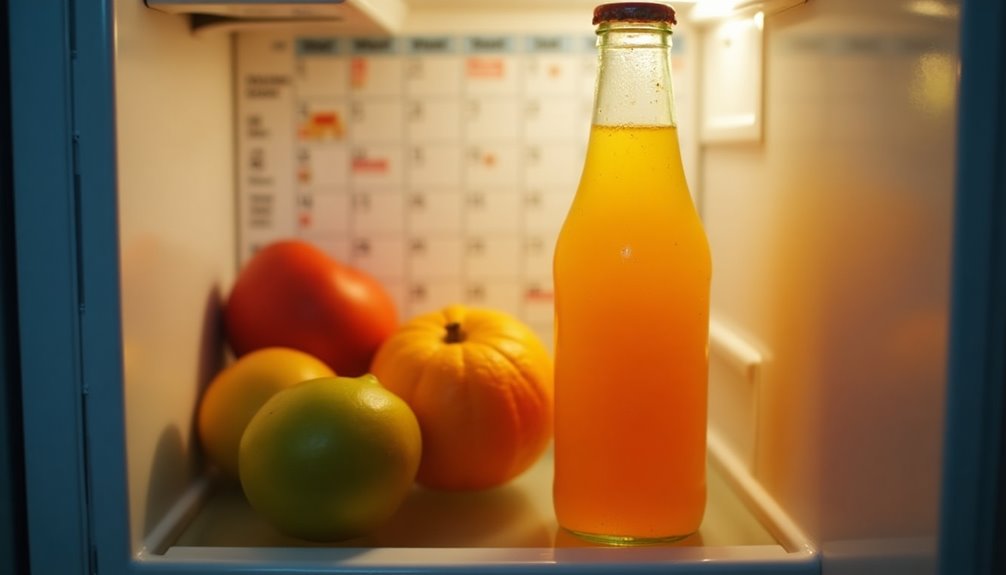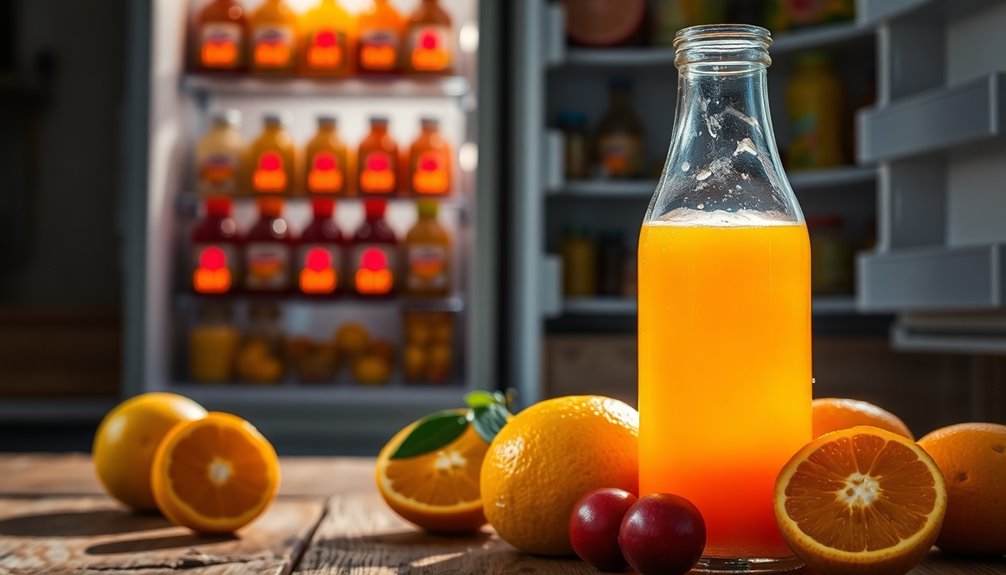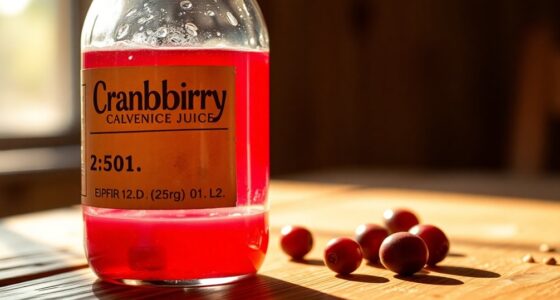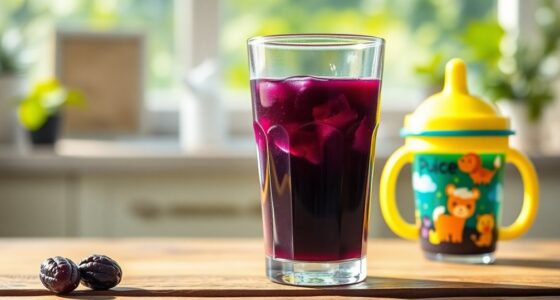Store-bought juice lasts differently in the fridge. Unopened refrigerated juice should be consumed within a week for the best quality. Once opened, it’s best to drink it within 5 to 7 days. Juices with added sugars or preservatives might last longer than pure fruit juice. Always check expiration dates and store juice properly. Want to know more about storage tips and shelf life for opened and unopened juice? You’re in the right place! To extend the shelf life of your juice, consider airtight storage options or using glass containers, as these can help minimize exposure to air and light. Additionally, if you’re wondering how long does fresh juice stay fresh, it’s typically best consumed within 72 hours for optimal flavor and nutritional value. Freezing is another option for longer storage, but be aware that it may alter the taste and texture upon thawing.
Key Takeaways
- Unopened refrigerated juice should be consumed within one week for optimal freshness.
- Opened refrigerated juice is best enjoyed within 5 to 7 days.
- Always check expiration dates closely to ensure safety.
- Proper refrigeration is crucial to maintain juice quality after opening.
- Juices with added sugars or preservatives may last longer than pure fruit juice.

Have you ever wondered how long that store-bought juice in your fridge really lasts? It's a common question, especially when you're trying to make the most of your grocery purchases. Knowing the shelf life of juice can help you avoid waste and ensure you're consuming it at its freshest.
When it comes to juice, the rules can vary based on whether it's unopened or opened, and the type of juice you're dealing with.
For unopened shelf-stable juice, you can generally expect it to last between 6 to 12 months if it's stored in a cool, dark place. This means you can keep it in your pantry or a cupboard without worrying too much about expiration.
However, once you crack that seal and open the bottle, the game changes. Opened shelf-stable juice should be consumed within 7 to 10 days when refrigerated. So, if you've got a half-finished bottle sitting in the back of your fridge, it's best to finish it up soon to enjoy the best taste and freshness.
Now, if you're dealing with unopened refrigerated juice, you'll usually want to consume it within a week. The freshness of refrigerated juice is a bit more delicate, so it's crucial to keep an eye on those expiration dates.
Once you open a bottle of refrigerated juice, the recommendation is to drink it within 5 to 7 days. It's all about proper storage to maintain the quality and safety of what you're drinking.
You might notice that some juices are labeled as containing added sugars and preservatives. Generally, these types of juice have a longer shelf life compared to 100% pure fruit juice.
The additional ingredients can help stabilize the juice, allowing it to last longer both unopened and after it's been opened. If you prefer the pure stuff, just be mindful of how quickly you go through it!
Always make it a habit to check the expiration or use-by date on the packaging before you take a sip. Those dates are there for a reason, and they can guide you on safe consumption.
If you ever find yourself with juice that's past its expiration date, it's a good idea to discard it rather than risk your health.
Frequently Asked Questions
Does Store-Bought Juice Go Bad in the Fridge?
Yes, store-bought juice can go bad in the fridge. After opening, it typically lasts about 5-7 days, depending on how it's stored.
If you notice any off smells, discoloration, or mold, it's best to toss it out.
Always check the expiration date and store it in a tightly sealed container to help it last longer.
Staying mindful of these signs ensures you enjoy your juice safely and fresh.
Can I Drink Juice 2 Weeks After Opening It?
You can drink juice two weeks after opening it, but it's risky.
If the juice has been properly stored, it might still be safe, but you should check for signs of spoilage first.
Look for any off smells, discoloration, or mold.
Even if it seems okay, bacteria could have developed, so it's better to be cautious.
If in doubt, throw it out to avoid potential foodborne illness.
Your health's worth it!
How to Tell if Juice Has Gone Bad?
To tell if juice has gone bad, start by smelling it; a sour or vinegar-like odor suggests fermentation.
Check the color—if it's darkened or faded, it might be past its prime.
Look for bubbles or fizz, which could indicate carbonation from fermentation.
Finally, inspect for mold on the surface or inside the container.
If the taste seems off or unpleasant, it's safer to toss the juice rather than risk your health.
Can You Drink 4 Day Old Juice?
You can drink 4-day-old juice if it's been stored properly.
Make sure it's been refrigerated immediately after opening and kept in an airtight container.
Before sipping, check for any off smells, discoloration, or mold. If everything seems fine, it's likely safe to enjoy.
Just remember to always check the expiration date on the packaging for added assurance.
If in doubt, it's better to err on the side of caution.
Conclusion
In conclusion, store-bought juice usually lasts about 7 to 10 days in the fridge once opened, but always check the expiration date. Just like a vintage vinyl record, its quality can fade over time, so enjoy it fresh for the best flavor. Keep an eye on any changes in smell or appearance, and don't hesitate to toss it if it seems off. Remember, your health's worth a little extra caution!
Cindy thoroughly researches juicing trends, techniques, and recipes to provide readers with practical advice and inspiration. Her writing style is accessible, engaging, and designed to make complex concepts easy to understand. Cindy’s dedication to promoting the advantages of juicing shines through her work, empowering readers to make positive changes in their lives through the simple act of juicing.

















